Related Research Articles

Albania, officially the Republic of Albania, is a country in Southeast Europe. The country is located in the Balkans on the Adriatic and Ionian Seas within the Mediterranean Sea and shares land borders with Montenegro to the northwest, Kosovo to the northeast, North Macedonia to the east and Greece to the south. Spanning an area of 28,748 km2 (11,100 sq mi), it displays a varied range of climatic, geological, hydrological and morphological conditions. The country's landscapes range from rugged snow-capped mountains in the Albanian Alps and the Korab, Skanderbeg, Pindus and Ceraunian Mountains, to fertile lowland plains extending from the coasts of the Adriatic and Ionian seas. Tirana is the capital and largest city in the country, followed by Durrës, Vlorë, and Shkodër.
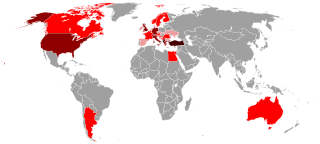
The Albanians are an ethnic group native to the Balkan Peninsula who share a common Albanian ancestry, culture, history and language. They primarily live in Albania, Kosovo, North Macedonia, Montenegro, Serbia as well as in Croatia, Greece, Italy and Turkey. They also constitute a large diaspora with several communities established across Europe, the Americas and Oceania.

The Balkans, corresponding partially with the Balkan Peninsula, is a geographical area in southeastern Europe with various geographical and historical definitions. The region takes its name from the Balkan Mountains that stretch throughout the whole of Bulgaria. The Balkan Peninsula is bordered by the Adriatic Sea in the northwest, the Ionian Sea in the southwest, the Aegean Sea in the south, the Turkish straits in the east, and the Black Sea in the northeast. The northern border of the peninsula is variously defined. The highest point of the Balkans is Musala, 2,925 metres (9,596 ft), in the Rila mountain range, Bulgaria.
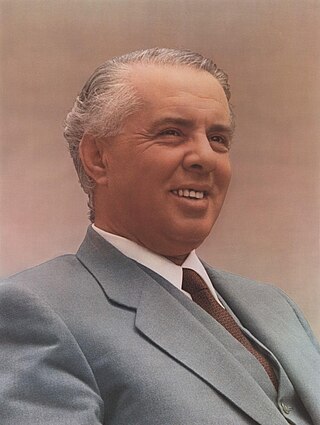
Enver Hoxha was an Albanian Communist politician who was the dictator of Albania from 1944 until his death in 1985. He was the First Secretary of the Party of Labour of Albania from 1941 until his death, a member of its Politburo, chairman of the Democratic Front of Albania, and commander-in-chief of the Albanian People's Army. He was the twenty-second prime minister of Albania from 1944 to 1954 and at various times was both foreign minister and defence minister of the country.
During classical antiquity, Albania was home to several Illyrian tribes such as the Albanoi, Ardiaei, Bylliones, Dassaretii, Enchele, Labeatae, Taulantii, Parthini, Penestae, Amantes, and many others, but also Bryges and Epirote tribes, as well as several Greek colonies established on the Illyrian coast in cooperation with the local Illyrians, notably Epidamnos-Dyrrhachium and Apollonia.

The Kosovo War, was an armed conflict in Kosovo that lasted from 28 February 1998 until 11 June 1999. It was fought between the forces of the Federal Republic of Yugoslavia, which controlled Kosovo before the war, and the Kosovo Albanian separatist militia known as the Kosovo Liberation Army (KLA). The conflict ended when the North Atlantic Treaty Organization (NATO) intervened by beginning air strikes in March 1999 which resulted in Yugoslav forces withdrawing from Kosovo.

Kosovo, officially the Republic of Kosovo, is a country in Southeast Europe with partial diplomatic recognition. Kosovo lies landlocked in the centre of the Balkans, bordered by Serbia to the north and east, North Macedonia to the southeast, Albania to the southwest, and Montenegro to the west. Most of central Kosovo is dominated by the vast plains and fields of Metohija and the Kosovo field. The Accursed Mountains and Šar Mountains rise in the southwest and southeast, respectively. Its capital and largest city is Pristina.

Tirana is the capital and largest city of Albania. It is located in the centre of the country, enclosed by mountains and hills with Dajti rising to the east and a slight valley to the northwest overlooking the Adriatic Sea in the distance. It is among the wettest and sunniest cities in Europe, with 2,544 hours of sun per year.

In Albania, World War II began with its invasion by Italy in April 1939. Fascist Italy set up Albania as its protectorate or puppet state. The resistance was largely carried out by Communist groups against the Italian and then German occupation in Albania. At first independent, the Communist groups united in the beginning of 1942, which ultimately led to the successful liberation of the country in 1944.

Vlorë is the third most populous city of the Republic of Albania and seat of Vlorë County and Vlorë Municipality. Located in southwestern Albania, Vlorë sprawls on the Bay of Vlorë and is surrounded by the foothills of the Ceraunian Mountains along the Albanian Adriatic and Ionian Sea Coasts. It experiences a Mediterranean climate, which is affected by the Ceraunian Mountains and the proximity to the Mediterranean Sea.

The Albania national football team represents Albania in men's international football, and is governed by the Albanian Football Association, the governing body for football in Albania.

The Albanian Football Association is the governing body of football in Albania. The association is based in Tirana, Albania. It organises the national football leagues of the Albanian Superliga, the First Division, the Second Division, the Third Division, the Albanian Cup and Supercup. Albania women's national football team, Albanian women's football championship, and the Albanian Women's Cup are also overseen. The association also coordinates the activities of the Albania national football team and the Albania national youth football teams such as Under-21, Under-20, Under-19, Under-18, Under-17, Under-16 and Under-15.
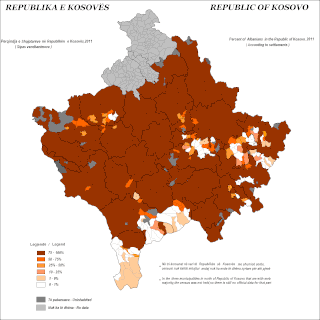
The Albanians of Kosovo, also commonly called Kosovo Albanians, Kosovan Albanians or Kosovars, constitute the largest ethnic group in Kosovo.
Albanian mafia or Albanian organized crime are the general terms used for criminal organizations based in Albania or composed of ethnic Albanians. Albanian organized crime is active in Europe, North America, South America, and various other parts of the world including the Middle East and Asia. The Albanian Mafia participates in a diverse range of criminal enterprises including trafficking in drugs, arms, and humans. Thanks to their close ties with the 'Ndrangheta of Calabria, they control a large part of the billion dollar wholesale cocaine market in Europe and appear to be the primary distributors of cocaine in various European drug hubs including London. Albanian organized crime is characterized by diversified criminal enterprises which, in their complexity, demonstrate a very high criminal capacity. In Albania, there are over 15 mafia families that control organized crime. According to some sources, Albania is the first European narco state.

Albanian folk beliefs and mythological stories comprise the beliefs expressed in the customs, rituals, myths, legends and tales of the Albanian people. The elements of Albanian mythology are of ancient Paleo-Balkanic origin and almost all of them are pagan. Albanian folklore evolved over the centuries in a relatively isolated tribal culture and society. Albanian folk tales and legends have been orally transmitted down the generations and are still very much alive in the mountainous regions of Albania, Kosovo, western North Macedonia, Montenegro and South Serbia and among the Arbëreshë in Italy and the Arvanites in Greece.

Gjergj Kastrioti, commonly known as Skanderbeg, was an Albanian feudal lord and military commander who led a rebellion against the Ottoman Empire in what is today Albania, North Macedonia, Greece, Kosovo, Montenegro, and Serbia.
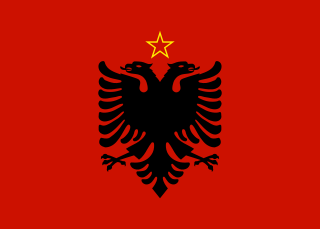
The People's Socialist Republic of Albania, officially the People's Republic of Albania from 1946 until 1976, was the one-party communist state in Albania from 1946 to 1991. It succeeded the Democratic Government of Albania (1944–1946).
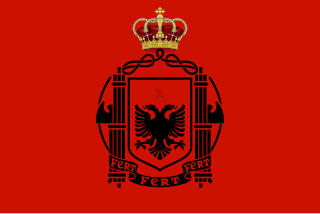
The Italian protectorate of Albania, also known as the Kingdom of Albania or Greater Albania, existed as a puppet state and protectorate of the Kingdom of Italy under Fascism. It was practically a union between Italy and Albania, officially led by Italy's King Victor Emmanuel III and its government: Albania was led by Italian governors, after being militarily occupied by Italy, from 1939 until 1943. During this time, Albania ceased to exist as an independent country and became an autonomous part of the Italian Empire. Officials intended to make Albania part of a Greater Italy by assimilating Albanians as Italians and colonizing Albania with Italian settlers from the Italian Peninsula to transform it gradually into an Italian land.
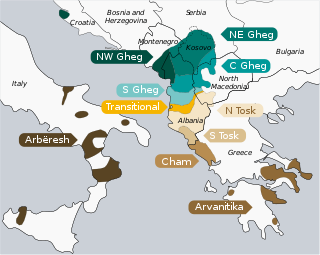
Albanian is an Indo-European language and the only surviving representative of its own branch, which belongs to the Paleo-Balkan group. Standard Albanian is the official language of Albania and Kosovo, and a co-official language in North Macedonia and Montenegro, as well as a recognized minority language of Italy, Croatia, Romania and Serbia. It is also spoken in Greece and by the Albanian diaspora, which is generally concentrated in the Americas, Europe and Oceania. Albanian is estimated to have as many as 7.5 million native speakers.

The Autonomous Republic of Northern Epirus was a short-lived, self-governing entity founded in the aftermath of the Balkan Wars on 28 February 1914, by the local Greek population in southern Albania.
References
- ↑ "Parliamentary group". pd.al.